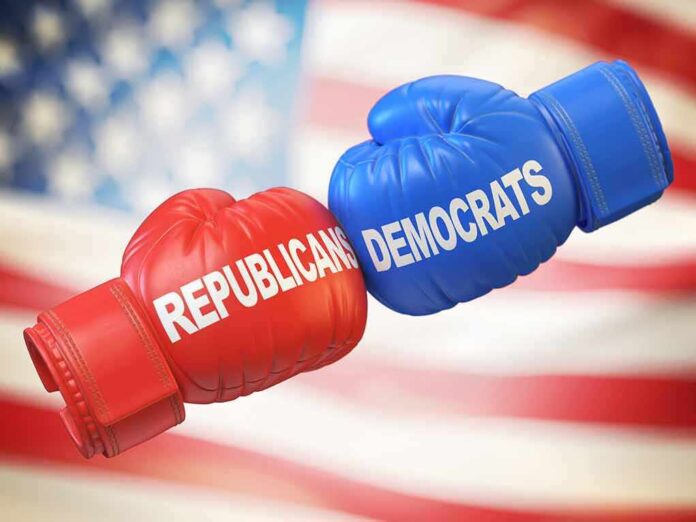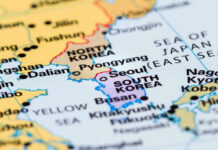As political polarization reaches new heights, concerns grow over the Democratic Party’s policies and their potential impact on American democracy.
At a Glance
- Political polarization in the U.S. has increased significantly over the past two decades
- The share of Americans with consistently conservative or liberal opinions has doubled from 10% to 21%
- Approximately 75% of American adults view the upcoming presidential election as crucial for the future of U.S. democracy
- Both Democrats and Republicans express concern that democracy could be at risk depending on the election outcome
- Some conservatives argue that the Democratic Party’s policies pose a significant threat to American democracy
The Widening Political Divide
Political polarization in the United States has reached unprecedented levels, with the ideological gap between Republicans and Democrats growing wider than ever before. According to a comprehensive study by the Pew Research Center, the share of Americans with consistently conservative or liberal opinions has doubled from 10% to 21% over the past two decades. This shift has led to a shrinking center in the political spectrum, with 92% of Republicans now positioned to the right of the median Democrat and 94% of Democrats to the left of the median Republican.
The intensification of partisan attitudes has resulted in increased animosity between the two major parties. Many Americans now view the opposing party’s policies as a direct threat to the nation’s well-being, creating a climate of mistrust and heightened political tension.
Democracy on the Ballot
As the nation approaches another presidential election, concerns about the future of American democracy have taken center stage. A recent poll conducted by The Associated Press-NORC Center for Public Affairs Research revealed that approximately 75% of American adults consider the upcoming election crucial for the future of U.S. democracy. This sentiment is shared across party lines, although the perceived threats differ based on political affiliation.
“Making the claim that the other candidate is trying to destroy democracy, it doesn’t really land for me. I think that we have things in place that should safeguard against when you kind of play at destroying democracy. We have other branches of government. We have people that believe in voting. So, it would be hard for a candidate to take over and become some kind of dictator.” – Daniel Oliver
While some Americans remain confident in the resilience of U.S. democracy, others express deep concern about the potential consequences of the election outcome. Interestingly, older adults are more likely than their younger counterparts to view the election as extremely important for the future of democracy.
Conservative Concerns About Democratic Policies
Some conservative voices argue that the Democratic Party’s policies and actions pose a significant threat to American democracy. Critics point to various issues, including the party’s approach to immigration, LGBTQ rights, and abortion, as well as alleged attempts to restructure key institutions like the Supreme Court and the Senate.
“Biden has tried to erase the student loans, and he’s been told by the courts that it’s unconstitutional to do that. He’s weaponized the FBI to get at his political opponents.” – Ernie Wagner
These concerns reflect a broader narrative among some conservatives who believe that Democratic policies are fundamentally altering the fabric of American society and challenging traditional values. However, it’s important to note that these views are not universally held and are part of the ongoing political debate in the country.
The Role of Media and Institutions
The increasing polarization of American politics is further exacerbated by the media landscape and the role of various institutions. Some argue that major institutions, including the media, academia, and corporations, have become increasingly aligned with left-leaning ideologies, potentially influencing public opinion and policy-making.
This perception of institutional bias has led to a growing distrust among some conservatives towards traditional sources of information and authority. The resulting “ideological silos” further contribute to the political divide, as individuals increasingly surround themselves with like-minded peers and information sources that reinforce their existing beliefs.
Looking Ahead
As the United States grapples with these deep-seated political divisions, the future of American democracy remains a topic of intense debate and concern. While perspectives on the nature and source of threats to democracy vary widely, there is a shared recognition of the importance of protecting and strengthening democratic institutions.
Moving forward, bridging the ideological gap and fostering constructive dialogue between different political factions will be crucial for maintaining the health and stability of American democracy. As the nation approaches another critical election, the ability to navigate these complex political dynamics will play a significant role in shaping the country’s future.
Sources:
- Political Polarization in the American Public
- Majority of US adults say democracy is on the ballot but they differ on the threat: AP-NORC poll
- Voters Decided Democrats Are The Biggest Threat To Democracy











